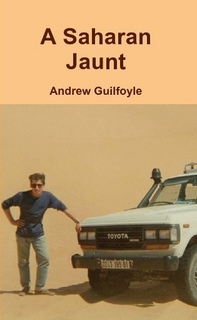
Yes, look at the picture, and try to guess where I am. Well, I guess the title of the book (and this is the cover page) gives away everything. Yes, I have led quite an interesting life, and the book is a travelogue about my travels across North Africa (right through the Sahara desert, right in the era of the first Gulf War, when no one (who was sane) ventured into that part of the world. It was a bit rough, more than a bit dangerous, but I got through it – just. And I even wrote this book about it.
Yes, I have travelled the world the hard way, first spending a year travelling around Australia on a motorbike, then travelling with a backpack for five years. I have sprayed weeds on a farm in outback Australia, picked fruit, scrubbed pots (in a restaurant in England = horrible job, and a country, which I would never recommend anyone to go to). I have climbed volcanoes (in South America, the Philippines, and Indonesian), and almost been killed on one of them [okay, volcanoes will erupt occasionally, so perhaps I should have expected it].
Of course, eventually I ran out of money and began teaching English (in Caracas, Venezuela, would you believe). Eventually, I returned to Australia to study modern English teaching methods (the Cambridge CELTA), then I hit Asia, and have never really left, going back to Australia only to keep studying (Cambridge DELTA, Masters), but there was a five-year stint at Monash University in Melbourne (in which I became a Cambridge CELTA teacher trainer).
Here's a question. Which of the following is true?
Teacher Andrew can speak some or good ...
- French.
- Indonesian.
- Spanish.
- Korean.
- Mandarin Chinese.
- (all of the above).
The answer is .... 6 ! I had to study French to travel across North Africa (Morocco and Algeria), Spanish to travel through Central and South America. I worked a year in Korea (and studied the language there), and travelled across Indonesia (spending 4 months before going studying the language). Why am I telling you all this? Because I have decided that, on this blog, in amongst all the …
- IELTS advice,
- IELTS/English grammar advice,
- ongoing consumer education about how to identify good teachers and good teaching practice,
- warnings about the traps and tricks (unfortunately) being widely used out there,
… I will insert the occasional ‘About My Travels’ piece, to add some variety to everything.
Okay, so where’s is the IELTS value in this? The IELTS value lies in the fact that you are reading English (NOT Chinese!!!!), and this is what IELTS is all about. Also, any difficult vocabulary is underlined (as always), and listed at the end of the post, allowing you to learn these words in context (which is how you really learn vocabulary [See my IELTS Reading Book, Tip 1, Strategy 1, Page 2]). Furthermore, there is a lot of research which says that reading for pleasure is one of the best forms of reading, because you enjoy what you read. Thus, the learning happens more naturally. [See my IELTS Reading Book, Tip 1, Strategy 7, Page 6]. Think about it. If you read material you are not interested in, and don’t care about, then immediately the learning is limited, right?
So, tomorrow, I'll put my first post about one of the countries I have visited. Check out the blog entry tomorrow.
Find the meaning of the underlined words, also repeated below.
- to venture (v)
- to scrub (v)
- to erupt (v)
- stint (n)
- context (n)



 留言列表
留言列表


